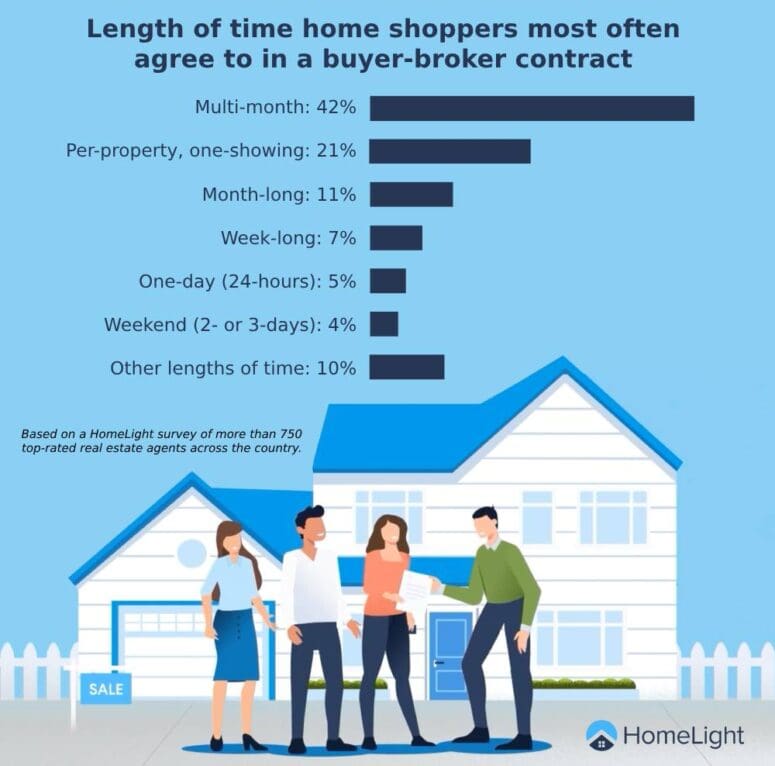Arizona Buyer-Broker Agreement: A Required Agent Contract
- Published on
- 11 min read
-
 Richard Haddad Executive EditorClose
Richard Haddad Executive EditorClose Richard Haddad Executive Editor
Richard Haddad Executive EditorRichard Haddad is the executive editor of HomeLight.com. He works with an experienced content team that oversees the company’s blog featuring in-depth articles about the home buying and selling process, homeownership news, home care and design tips, and related real estate trends. Previously, he served as an editor and content producer for World Company, Gannett, and Western News & Info, where he also served as news director and director of internet operations.
If you’re planning to buy a home in Arizona, you’ll now need to sign a buyer-broker agreement before touring properties with a real estate agent. This requirement is part of a nationwide change attached to a court settlement by the National Association of Realtors (NAR).
“The NAR settlement has not only confused buyers and sellers, but agents also seemed to be confused,” David Cochran, a top agent in Surprise, Arizona, with 52 years of experience, told Homelight in a recent survey.
This guide will explain a buyer-broker agreement, why it’s required, and how it affects the home-buying process in Arizona.
Do you have to sign a buyer-broker agreement in Arizona?
Yes, Arizona buyers using an agent with MLS access must sign a buyer-broker agreement before touring homes with the agent. Following a series of lawsuits, a federal court determined that NAR’s long-established agent commission structure and policies infringed upon federal antitrust laws. These new rules became effective August 17, 2024.
The changes are meant to provide more transparency in real estate transactions and ensure that buyers and agents formalize their working relationship before any home tours occur. The signed agreements are also designed to help buyers have a clearer understanding of their financial obligations, including compensating their agent.
While the advance written contract requirement might feel significant for buyers in Arizona, it aligns with practices that were already required in 18 other states.
“There’s been much more confusion in [the industry], but it’s only had a minimal impact for me because I explain these things to my clients,” said Heather Martin, a top agent and fifth-generation Arizonian serving the Phoenix metro area. “I have only had to refuse to work with a few clients who ‘already had an agent,’ so they didn’t get stuck paying duplicate Realtor fees. They appreciated my honesty.”
What is a buyer-broker agreement?
A buyer-broker agreement is a written contract between a homebuyer and their real estate agent. It spells out the responsibilities of both parties, including:
- The real estate agent’s duties, such as locating properties that meet buyer needs, scheduling home tours and showings, and negotiating the purchase on the buyer’s behalf.
- The buyer’s obligation to work with the agent and compensate them for their services, typically through a commission. Many agreements are written in a way that requires the buyer to work exclusively with the signing agent. However, that’s not always the case. The post-settlement market is opening up more flexible terms as agents compete for clients and commissions.
What’s in the new buyer-broker agreements?
The new buyer-broker agreements may differ slightly by state, but they are all designed to clarify the working relationship between buyers and agents. Some common elements are:
- Exclusive agent representation: Your Arizona buyer-broker agreement may contain a clause stating that you agree to work only with the signing agent during a specified length of time. You can negotiate this clause and timeframe. However, some Realtors may offer a preliminary, nonexclusive touring agreement followed by a more detailed contract if you choose to continue with the agent.
- What you can expect for your fees: The buyer-broker agreement outlines your agent’s specific responsibilities, from touring properties and submitting offers to negotiating and closing the deal.
- Commission terms: The agreement with show the details of how and when your agent will be compensated, and who is expected to pay the fees.
- The length of the agreement: You’ll know the exact start and end dates of the contract.
- Cancellation requirements: The agreement will state the process for terminating the agreement — the terms required for both the agent and the buyer. This may include a dollar amount the buyer must pay if the cancellation conditions are not met.
While this may seem like a lot to consume, a reputable agent should be willing to explain the terms of their buyer-broker agreement and give you the time you need to ask questions.
“Buyers have heard about these [changes] and understand part of the settlement but don’t fully understand what it means,” wrote Joe Bourland, a top Phoenix area agent with 24 years of experience.
Other buyer-broker agreement considerations
Dual agency: If your buyer-broker agreement says you agree to view homes an agent has listed with their own seller clients, your agent will represent both you and the seller. This dual representation, known as dual agency, is legal in Arizona with written consent. It is not legal in some states due to the potential for conflict of interest.
Nonexclusive agreement: As the buyer, if you sign with an agent offering a nonexclusive contract, you can work with other agents to purchase a home — you’re not locked into a long-term commitment. Nonexclusive buyer-broker agreements are becoming more common in initial home touring contracts as hesitant buyers grapple with the new NAR rules.
Read your buyer-broker agreement carefully: If you or the signing agent fail to honor the terms in the agreement, the other party can take legal action and claim damages. Be certain to read through the contract carefully and address any concerns prior to signing.
How does this impact Arizona homebuyers?
Before you start shopping for a home, you’ll need to be aware of the new NAR settlement rules. The two biggest changes include:
- Written agreements are required before touring homes
You must sign a buyer-broker agreement before viewing properties with an agent. How to fully comply with this pre-touring requirement has been debated in many states. The Arizona Department of Real Estate posted a Consumer Advisory to provide guidance for buyers signing a contract to tour a home.
“There is a lot of misinformation out there [about the new rules],” wrote Anthony Sherman, a Litchfield Park, Arizona, agent with 23 years of experience. “It takes time to provide correct information — and for buyers and sellers to digest the correct information.”
The Arizona Realtors Association has created an FAQ page dedicated to its Buyer-Broker Agreement to Show Property
- Buyers are responsible for their own Realtor fees:
As the buyer, it’s now your obligation to pay your agent’s commission fees. However, you can negotiate with the seller to cover this cost in your purchase offer. In some Arizona markets, listing agents are advising their seller clients to offer this as a concession in order to attract more buyers.
“I have had buyers tell me they don’t want to look at a home if the seller isn’t offering a commission,” wrote Jerry Beavers, a top Mesa, Arizona, agent with 25 years of helping buyers find their dream homes.
“Sellers are more uneducated than the buyers,” said Rebecca Kallhoff, a top-selling agent in Arizona’s San Tan Valley with 20 years of experience. “As a listing agent, I have to explain it more often to sellers, along with the pros and cons of offering a buyer’s agent compensation.”
Can you sign a one-day buyer-broker agreement?
Because the new NAR settlement rules require buyers to sign a contract before touring homes, many Arizona agents are providing flexible terms, including one-day or one-property agreements. A good agent will always strive to put their clients at ease rather than make them feel pressured to sign a long-term commitment.
“Only once did I have an issue [with a client],” wrote Ann Adams, a highly-rated agent in Chandler, Arizona, who has been helping buyers find homes for 18 years. “We can sign a one-time showing agreement or a multiple-month agreement and cancel anytime.”
Adams explained that, in the long run, this flexibility brings peace of mind to her clients and ultimately benefits her as a real estate professional. “I am now often getting paid more as a buyer’s agent, especially when there is no competing offer on the table.”
How long are buyers willing to commit to a broker agreement?
In a national survey of more than 750 top-rated agents, HomeLight found that most agents are modifying their buyer-broker agreements — or their initial touring agreements — to fit the timeframe their clients want. According to the survey, here are the contract terms buyers are asking for:
- Multi-month agreement: 42%
- Per-property, one-showing agreement: 21%
- Month-long agreement: 11%
- Week-long agreement: 7%
- One-day (24-hour) agreement: 5%
- Weekend (2- or 3-day) agreement: 4%
- Other lengths of time: 10%
Key benefits of the Arizona buyer-broker agreement
While the buyer-broker agreement requirement may feel like an extra step or commitment bridge in your Arizona home search journey, these contracts offer several advantages:
- Better transparency: Both you and your real estate agent have a clear understanding of your respective responsibilities before, during, and after the purchase.
- Commitment confidence: The agreement fosters a sense of mutual dedication to the home-buying process from the first showing to the closing.
- Greater negotiation options: As a buyer, you now have more influence over how your Realtor’s fees are handled, creating room for financial creativity and flexibility.
Learn more: To learn more about how the NAR settlement rule changes might impact your buying or selling plans, the NAR has created both a buyer’s guide and a seller’s guide with more consumer information.
FAQs about the Arizona buyer broker agreement
According to an NAR fact sheet, “You do not need a written agreement if you are just speaking to an agent at an open house or asking them about their services.” These formal contracts typically apply to private showings with a Realtor who has access to the MLS. However, if you have already signed an exclusive contract with an Arizona buyer’s agent, and you visit an open house and decide to purchase the home, you may be required to pay your contracted agent a commission, even if the agent did not find the property.
No, buyer-broker agreements can look very different, depending on what you negotiate with your agent. For example, one contract might be for a single day of touring properties, while another might include a multi-month term. Before signing any agreement, review the terms carefully and ask questions so you know what’s required. You might want to have the contract reviewed by your legal advisor.
When considering a buyer-broker agreement, some red flags might include:
- Extended-term limits that lock you in for a long period of time
- Excessive or non-negotiable commission fees
- Vague cancellation terms
- Unreasonable penalties for terminating the contract
After a series of lawsuits, a federal court determined that the long-established real estate agent commission structures and rules put in place by the National Association of Realtors infringed upon federal antitrust laws and pressured home sellers into paying commission fees that could be paid by the homebuyer. The rule changes help promote more transparency and ensure that buyers understand their responsibility for Realtor fees.
No, the new NAR rules do not determine agent commission amounts. This was true with buyer-broker agreements even before the NAR settlement. Realtor commissions have always been negotiable.
You can negotiate Realtor fees in the buyer-broker agreement. A HomeLight survey found that a typical buyer’s agent commission can be between 2.5%-3%. However, you can hire a discount or low-commission agent or service. You may also be able to negotiate a lower agent fee for a less complicated property sale, such as between family members.
Below is a table that illustrates various percentages of commissions on an Arizona median-priced $440,000 home.
Commission examples on $440,000 home
| Commission rate | Buyer agent fee | Commission rate | Buyer agent fee |
| 1.25% | $5,500 | 2.25% | $9,900 |
| 1.5% | $6,600 | 2.5% | $11,000 |
| 1.75% | $7,700 | 2.75% | $12,100 |
| 2% | $8,800 | 3% | $13,200 |
Bottom line: Arizona buyer-broker agreements
“Every single client I work with has a different interpretation of the new NAR settlement,” wrote Valerie Caro, a HomeLight Elite agent in Flagstaff with nearly 40 years of experience. She and other top agents agree that while it’s an extra step, a buyer-broker agreement can add transparency and empower buyers by clarifying responsibilities.
These contracts can also remind us that reputable agents dedicate a great deal of time, effort, and expertise to helping their clients. A skilled Realtor should be able to expect fair compensation.
At the same time, top agents like those who contributed to this post also know that they must earn your trust. This is why many seasoned agents are offering flexible buyer-broker agreement options that comply with the new NAR settlement rules.
If you’re buying a home in Arizona, take the time to read and understand the buyer-broker agreement. Ask questions and discuss concerns with your agent. By fully understanding the contract, you can approach your home search with confidence and clarity.
Header Image Source: (RDNE Stock project / Pexels)
Looking for a top-rated Arizona agent you can trust? HomeLight can connect you with performance-proven buyer’s agents in your Arizona market. We analyze nearly 30 million transactions and thousands of reviews to determine which agent is best for you based on your unique needs. If your goal is to buy before you sell, visit this link for HomeLight’s modern solution. Watch this short video to see how the HomeLight Buy Before You Sell program works.
Editor’s note: This post is for educational purposes. If you need assistance with a buyer broker agreement in Arizona, HomeLight encourages you to consult a professional advisor.
- "Real Estate Commission Structure Found to Violate Antitrust Law," JD Supra, Miller Nash, LeAnne Bremer & Beatrice Bremer Lucas (November 2023)
- "Homebuyers: Here's What the NAR Settlement Means for You," NAR (August 2024)
- "NAR: 18 states require written buyer agency agreements," South Carolina Realtors (August 2023)
- "What is an Exclusive Buyers Agency Agreement?," National Association of Exclusive Buyer Agents (July 2022)
- "Agency – The First Question that a Lawyer is Going to Ask," Arizona Realtors (September 2023)
- "Consumer Advisory: A Licensee May Ask You to Sign a Contract to Tour A Home beginning in August; Read It and Understand It," Arizona Department of Real Estate (July 2024)





